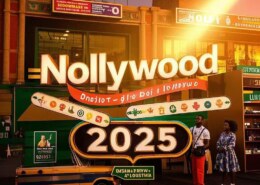The global film industry is dominated by a handful of powerful players, with Hollywood and Nollywood standing out as two of the most influential. While Hollywood in the United States is recognized as the epicenter of global cinema, Nigeria’s Nollywood has emerged as one of the most prolific film industries in the world. Comparing the two reveals striking contrasts in history, scale, production style, challenges, and global influence — yet both industries contribute significantly to shaping global storytelling.
Historical Background
Hollywood
-
Originated in the early 20th century in Los Angeles, California.
-
The “Golden Age of Hollywood” (1920s–1960s) established film as mass entertainment worldwide.
-
Hollywood pioneered the studio system, genre filmmaking, and global film distribution.
Nollywood
-
Emerged in the early 1990s with low-budget, straight-to-video productions.
-
The 1992 release of Living in Bondage is widely considered the birth of Nollywood.
-
Grew rapidly through affordable VHS and later VCDs, making films accessible across Africa.
Production and Scale
Hollywood
-
Produces 500–700 films annually (though numbers fluctuate).
-
Emphasizes big-budget productions, often exceeding $100 million per film.
-
Relies heavily on advanced technology, visual effects, and global marketing.
-
Dominated by “blockbusters” and franchises (Marvel, Star Wars, Avatar).
Nollywood
-
Produces 2,000+ films annually, making it one of the most prolific industries globally.
-
Traditionally low-budget, with films costing between $25,000–$75,000.
-
Focuses on fast-paced production, often completing films within weeks.
-
Emphasizes relatable stories rooted in African culture, family, and social issues.
Distribution and Audience Reach
Hollywood
-
Global distribution through cinemas, streaming platforms, and international markets.
-
Dominates the box office worldwide, especially in North America, Europe, and Asia.
-
Heavily supported by global streaming platforms like Netflix, Disney+, and Amazon Prime.
Nollywood
-
Initially thrived through local DVD markets and informal distribution networks.
-
Now expanding through streaming platforms (e.g., Netflix, Showmax, Amazon Prime Video).
-
Main audience is Africa and the diaspora, though it is gaining global recognition.
Storytelling and Themes
Hollywood
-
Diverse themes but often geared toward global appeal.
-
Emphasis on fantasy, action, sci-fi, and universal narratives.
-
Strong star system: actors and directors play a central role in marketing.
Nollywood
-
Storytelling rooted in Nigerian and African culture, traditions, and everyday struggles.
-
Focuses on themes of family, love, morality, religion, and corruption.
-
Increasing experimentation with genres such as thrillers, comedies, and historical epics.
Economic Impact
Hollywood
-
Contributes over $70 billion annually to the U.S. economy.
-
Supports millions of jobs in acting, directing, production, and distribution.
-
Has a major influence on global popular culture and soft power.
Nollywood
-
Contributes over $7 billion annually to Nigeria’s economy.
-
Provides employment for over 1 million people, making it one of Nigeria’s largest employers.
-
Boosts Nigeria’s cultural influence across Africa and beyond.
Challenges
Hollywood
-
High production costs and reliance on blockbuster success.
-
Increasing competition from international cinemas (e.g., Bollywood, Chinese film industry).
-
Criticism over lack of diversity and representation.
Nollywood
-
Struggles with piracy, poor distribution infrastructure, and limited cinema reach.
-
Budget constraints affect technical quality (though this is improving).
-
Need for more global recognition and sustainable funding models.
Global Influence and Future Outlook
-
Hollywood remains the dominant force, shaping global trends, visual standards, and entertainment consumption.
-
Nollywood, however, represents a rising cultural powerhouse, showcasing African narratives to the world. Streaming platforms are helping Nollywood films reach global audiences, with productions like The Wedding Party, Lionheart, and King of Boys receiving international acclaim.
The future of both industries lies in collaboration — with Nollywood learning from Hollywood’s technological expertise while offering authentic African stories to enrich global cinema.
Conclusion
Hollywood and Nollywood operate in very different contexts — one as a century-old global giant, the other as a relatively young but rapidly growing cultural force. While Hollywood epitomizes glamour, technology, and mass-market appeal, Nollywood thrives on cultural authenticity, speed, and accessibility. Together, they highlight the diversity of world cinema, proving that storytelling, whether from Los Angeles or Lagos, remains a universal human art form.

